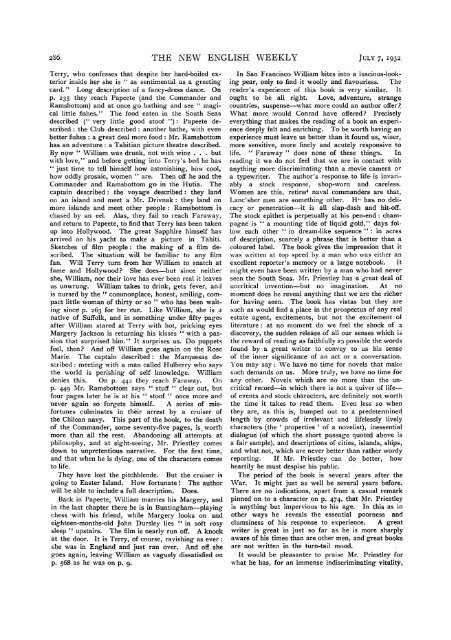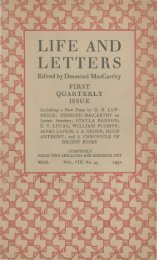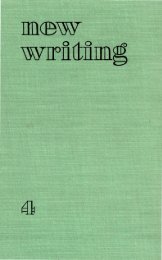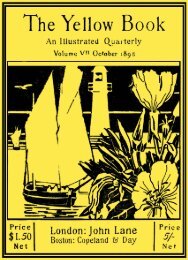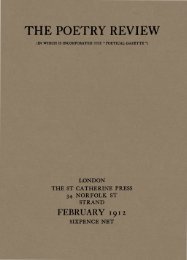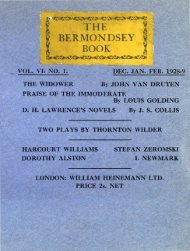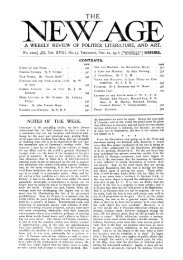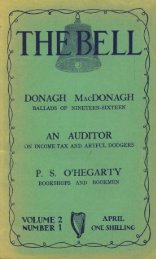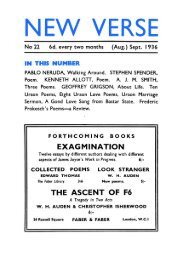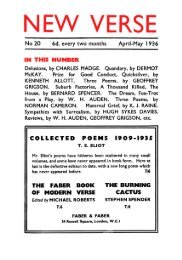Vol. I No. 12 - Modernist Magazines Project
Vol. I No. 12 - Modernist Magazines Project
Vol. I No. 12 - Modernist Magazines Project
You also want an ePaper? Increase the reach of your titles
YUMPU automatically turns print PDFs into web optimized ePapers that Google loves.
386: THE NEW ENGLISH WEEKLY Juur 7, 1932,<br />
Terry, who confesses that despite her hard-boiled exterior<br />
inside her she is " as sentimental as a greeting<br />
card." Long description of a fancy-dress dance. On<br />
p. 235 they reach Papeete (and the Commander and<br />
Ramsbottom) and at once go bathing and see " magical<br />
little fishes." The food eaten in the South Seas<br />
described (" very little good stoof ") : Papeete described<br />
: the Club described : another bathe, with even<br />
better fishes : a great deal more food : Mr. Ramsbottom<br />
has an adventure : a Tahitian picture theatre described.<br />
By now " William was drunk, not with wine . . . but<br />
with love," and before getting into Terry's bed he has<br />
" just time to tell himself how astonishing, how cool,<br />
how oddly prosaic, women " are. Then off he and the<br />
Commander and Ramsbottom go in the Hutia. The<br />
captain described : the voyage described : they land<br />
on an island and meet a Mr. Drivnak : they land on<br />
more islands and meet other people : Ramsbottom is<br />
chased by an eel. Alas, they fail to reach Faraway,<br />
and return to Papeete, to find that Terry has been taken<br />
up into Hollywood. The great Sapphire himself has<br />
arrived on his yacht to make a picture in Tahiti.<br />
Sketches of film people: the making of a film described.<br />
The situation will be familiar to any film<br />
fan. Will Terry turn from her William to snatch at<br />
fame and Hollywood? She does—but since neither<br />
she, William, nor their love has ever been real it leaves<br />
us unwrung. William takes to drink, gets fever, and<br />
is nursed by the " commonplace, honest, smiling, compact<br />
little woman of thirty or so " who has been waiting<br />
since* p. 263 for her c'ue. Like William, she is a<br />
native of Suffolk, and in something under fifty pages<br />
after William stared at Terry with hot, pricking eyes<br />
Margery Jackson is returning his kisses " with a passion<br />
that surprised him." It surprises us. Do puppets<br />
feel, then? And off William goes again on the Rose<br />
Marie. The captain described: the Marquesas described<br />
: meeting with a man called Hulberry who says<br />
the world is perishing of self knowledge. William<br />
denies this. On p. 442 they reach Faraway. On<br />
p. 449 Mr. Ramsbottom says " stuff " clear out, but<br />
four1 pages later he is at his " stoof " once more and<br />
never again so forgets himself. A series of misfortunes<br />
culminates in their arrest by a cruiser of<br />
the Chilean navy. This part of the book, to the death<br />
of the Commander, some seventy-five pages, is .worth<br />
more than all the rest. Abandoning all attempts at<br />
philosophy, and at sight-seeing, Mr. Priestley comes<br />
down to unpretentious narrative. For the first time,<br />
and that when he is dying, one of the characters comes<br />
to life.<br />
They have lost the pitchblende. But the cruiser is<br />
going to Easter Island. How fortunate ! The author<br />
will be able to include a full description. Does.<br />
Back in Papeete, William marries his Margery, and<br />
in the last chapter there he is in Buntingham—playing<br />
chess 'with his friend, while Margery looks on and<br />
eighteen-months-old John Dursley lies " in soft rosy<br />
sleep " upstairs. The film is nearly run off. A knock<br />
at the door. It is Terry, of course, ravishing as ever :<br />
she was in England and just ran over. And off she<br />
goes again, leaving William as vaguely dissatisfied on<br />
p. 568 as he was on p. 9.<br />
In San Francisco William bites into a luscious-looking<br />
pear, only to find it woolly and flavourless. The<br />
reader's experience of this book is very similar. It<br />
ought to be all right. Love, adventure, strange<br />
countries, suspense—what more could an author offer?,<br />
What more {would Conrad have offered? Precisely<br />
everything that makes the reading of a. book an experience<br />
deeply felt and enriching. To be worth having an<br />
experience must leave us better than it found us, wiser,<br />
more sensitive, more finely and acutely responsive to<br />
life. " Faraway " does none of these things. In<br />
reading it we do not feel that we are in contact with<br />
anything more discriminating than a movie camera or<br />
a typewriter. The author's response to life* is invariably<br />
a stock response, shop-worn and careless.<br />
Women are this, retired naval commanders are that,<br />
Lanc'sher men are something other. H^ has, no delicacy<br />
or penetration—it is all slap-dash arid hit-off.<br />
The stock epithet is perpetually at his pen-end : champagne<br />
is " a mounting tide of liquid gold," days follow<br />
each other * * in dream-like sequence " : in acres<br />
of description, scarcely a phrase that is better than a<br />
coloured label. The book gives the impression that it<br />
was written at top speed by a man who was either an<br />
excellent reporter's memory or a lai;ge notebook. It<br />
might even have been written by a man who had never<br />
seen the South Seas. Mr. Priestley has a great deal of<br />
uncritical invention—but no imagination. At no<br />
moment does he reveal anything that we are the richer<br />
for having seen. The book has vistas but they are<br />
such as would find a place in the prospectus of any real<br />
estate agent, excitements, but not the excitement of<br />
literature : at no moment do we feel the shock of a<br />
discovery, the sudden release of all pur senses which is<br />
the reward of reading as faithfully as possible the words<br />
found by a great writer to convey to us his sense<br />
of the inner significance of an act or a conversation.<br />
You may say : We have no time for novels that make<br />
such demands on us. More truly, we have no time for<br />
any other. <strong>No</strong>vels which are no more than the uncritical<br />
record—in which there is not a quiver of life—<br />
of events and stock characters, are definitely not worth<br />
the time it takes to read them. Even less so when<br />
they are, as this is, bumped out to a predetermined<br />
length by crowds of irrelevant and lifelessly lively<br />
characters (the * properties ' of a novelist), inessential<br />
dialogue/ (of which the short passage quoted above is<br />
a fair sample), and descriptions of cities, islands, ships,<br />
and what not, which are never better than rather wordy<br />
reporting. If Mr. Priestley can do better, how<br />
heartily he must despise his public.<br />
The period of the book is several years after the<br />
War. It might just as well be several years before.<br />
There are no indications, apart from a casual remark<br />
pinned on to a character on p. 474, that Mr. Priestley<br />
is anything but impervious to his age. In this as in<br />
other ways he reveals the essential poorness and<br />
clumsiness of his response to experience. A great<br />
writer is great in just so far as he is more sharply<br />
aware of his times than are other men, and great books<br />
are not written in the turn-tail mood.<br />
It would be pleasanter to praise Mr. Priestley for<br />
what he has, for an immense indiscriminating vitality,


